|
|||
| Life | |||
| 1854: [Oscar Fingal O’Flahertie Wills Wilde; var. O’fflahertie; College and early literature signature, ‘Oscar F. O’F. Wilde’]; b. 16 Oct. 1854, at 21 [recte; with vars. 15, 23] Westland Row, Dublin, son of Dr. (later Sir) William Robert Wilde [q.v.] and his wife Jane Francesca Elgee [q.v.]; OW was bapt. St Mark’s Church of Ireland Parish, Brunswick St. by his uncle Rev. Ralph Wilde [26 April 1855 per Church of Ireland registry - as infra]; by repute he was subseq. bapt. by Catholic priest at Glencree at his mother’s request, his maternal grandmother being an O’Flynn; dressed as girl in early childhood, poss. to ward off fairies [see note]; family moved to 1 Merrion Square [East], 1855; ed. Royal School, Portora, Enniskillen Co. Fermanagh, 1864-71, with his elder brother William [b. 26 Sept. 1852]; occas. plays with children of Joseph Sheridan Le Fanu; suffers at death in Longford of his little sister, Isola [aetat. 10; b. 2 April 1857, d. in 1867 at 1 Merrion Sq., N.; acc. to Oscar, ‘dancing as a golden sunbeam about the house’ - a lock of whose hair he always carried and for whom he wrote “Requiescat”; spends holidays at Moytura, the family house in Mayo [also the locale of the mythological battles in the Book of Invasions/Gabhala]; wins Portora School Scholarship to Trinity College, Dublin [TCD], reading Classics, 1871-74; roomed with Willie at Botany Bay, 1872-73; elected Foundation Scholar, 1873 [by examination]; challenges college bully to fisticuffs and wins; | |||
| tutored in classics by Robert Tyrrell (chair of Latin) and J. P. Mahaffy (chair of ancient history; q.v.); disdained Third Year exams but took Berkeley Gold medal for Greek at TCD; visited Geneva and Paris with Lady Wilde; assists Mahaffy with proofs of Social Life in Greece from Homer to Menander (1874), duly acknowledged in the preface; matriculates at Magdalen College, Oxford, 17 Oct. 1874, entering that college with a Demyship on his birthday, 1874 (‘My accent was one of the things I lost at Oxford’); grad. in Classic (“Greats”), 1878; made friends with David Hunter Blair, later a convert to Catholicism, Reginald Harding, William Ward, and others; became acquainted with Walter Pater and John Ruskin; visits Florence, Venice, Padua, Verona, and Milan with Mahaffy, Summer 1875; falls in love Florence Balcombe (‘just seventeen and the most perfectly beautiful face I ever saw and not a sixpence of money’ – letter to Ward), who subsequently becomes engaged to Bram Stoker in 1878; | |||
| 1875: publishes “Chorus of Cloud-Maidens” in Dublin University Magazine, 1875; meets Frank Miles in London, and Lillie Langry in the former’s studio; travels with Miles to his home in Nottingham and afterwards to the Wildes’ fishing lodge in Connemara (where Miles made murals of the Wilde boys as fishing cherubs), August 1875; death of Sir William Wilde, 19 April, 1876; assists Mahaffy with Rambles and Studies in Greece; travels with Mahaffy to Genoa and Ravenna and onwards to Corfu, Olympia, Argos, Aegina, Athens, and Mycenae, setting aside a meeting planned with Blair and Ward in Rome, Spring 1876; detours to Rome on return journey and gains audience with Pope Pius IX, arranged by David Hunter Blair (‘I would go over as a luxury’); sent down for the remainder of the term at Magdalen for returning late; stays in London and reviews the Grosvenor Gallery opening exhibition, 1876; | |||
| returns to Dublin; sudden death of his half-br. Henry Wilson, from whom he receives a small legacy conditional on his remaining Anglican for five years; Class Moderations (Oxon.), 1876; wins Newdigate Prize for “Ravenna” (poem), 10 July, 1878; takes Double First (Litterae Humaniores), 19 July 1878; appears to have received mercury treatment (used for syphilis), March 1878 [acc. Ellmann]; narrowly misses fellowship, 1879; engages in flirtation with Violet Hunt in Dublin, 1879; sets up in London as ‘Professor of Aesthetics’, 1879; moves to London and takes rooms at Salisbury St. (off the Strand), with Miles, displaying a port. of Lillie Langtry by Edward Poynter on an easel therein; his mother and elder brother move to London also, May 1879; strews Madonna lilies before Sarah Bernhardt on her arrival at Dover with Comédie Française; writes Vera, or The Nihilists, autumn 1880; probably proposed to Violet Hunt and Charlotte Montefiore, to be refused by both, 1880; | |||
| [ top ] | |||
| 1881: Vera scheduled for Adelphi production in December but withdrawn on account of assassination of Tsar Alexander II, March 1881 (Princess Alexandra being sister of the Tsarina), and that of President Garland in America; proposes to Charlotte Montefiori, 1881; began to be caricatured in Punch as Jellaby Postlethwaite, the ‘quite too utterly’ poet, and appears thus more than fifty times in issues of 1881; returns to London and meets Constance Mary Lloyd (b. 1858), through Dublin friends, 1881 [‘She scarcely ever speaks, I am always wondering what her thoughts are like’]; issues Poems (July 1881) [var. June], at his own expense; sends copy to Oxford Union, which is refused after division on morality of collection; forced to leave accommodation shared with Miles at the instance of the latter’s clerical father; moves into his mother’s house in London; satirised in Gilbert and Sullivan’s Patience as the outrageous aesthete Reginald Bunthorpe, contrasted with Archibald Grosvenor as the ‘fleshly’ and ‘spiritual’ types of aesthete respectively, April 1881; American tour proposed by Carte of D’Oyly Carte following success of Patience in New York (Sept. 1881); departs for America on a tour organised by Col. Morse, 24 Dec. 1881; | |||
| 1882: programme incls. “The English Renaissance in Art” (9 Jan.), lectures revised to suit his audience as “The Decorative Arts”, and “The House Beautiful”; visits Walt Whitman in company with J. M. Stoddart, 18 Jan. 1882; represents himself as ‘the son of one of Ireland’s noblest daughters’ in St. Paul, Minnesota, St. Patrick’s Day, 1882; greeted as ‘Speranza’s Boy’ in San Francisco, April, 1882 and eulogised ‘Speranza’ again in his lecture on “The Irish Poets of ’48”; called ‘epicene’ by Bodley in New York Times ; gives total of 140 lectures; arranges for production of Vera in New York; returns home with $6,000 in lecture fees and commission to write blank-verse The Duchess of Padua for American actress Mary Anderson; visited the room in New York where Poe wrote “The Raven” with Tilton, 10 Nov. 1882; issues fourth and fifth revised edns. of Poems (1882); seeks appointment as a Schools Inspector; Vera produced unsuccessfully in New York, 1883, with Marie Prescott as Vera Sabouroff; The Duchess of Padua rejected by Mary Anderson (‘We shan’t be able to dine with the Duchess tonight, Robert’) but published in 1883; | |||
| commences friendship with his first biographer Robert Sherard; moved to Paris, Autumn 1882-March 1883; living at Hotel Voltaire, Rive Gauche; influenced by Paul Verlaine, whom he met at Café Vachette, as well as Maurice Rollinat, and Edmond de Goncourt (espec. “La Faustin”) whom he met on 21 April 1883, and who characterised him in his Journal as a creature ‘au sexe douteux’; wrote poem about ‘passionate purity of brown-skinned boys’, 1883; meets Victor Hugo, who nonetheless sleeps at one of his soirées; embarks on new lecture touring, “Personal Impressions of America”, adding to his repertoire, organised again by Col. Morse; proposes to Constance, Dublin Nov. 1883; m. Constance, 29 May, 1885, she bringing marriage allowance of £250; honeymoons in Paris and Dieppe, and reads Joris-Karl Huysman’s À Rebours, the record of Des Esseintes aristocratic life of aesthetic self-indulgence, identifiable with the “poisonous” book that Dorian Gray reads in Wilde’s novel; Cyril b. 1885; | |||
[ top ] |
|||
| 1886: OW moves to 16 Tite St., Chelsea, 1 Jan. 1886, otherwise ‘The House Beautiful’, designed by Edward William Godwin, arch. and stage-designer, and decorated in a style the antithesis of Victorian opulence; placed a bust of Hermes, god of liars and thieves, in his ground-floor library; lectured on “The Value of Art in Modern Life”, and “Dress”; Vyvyan b. 1886; relations with Constance cease after difficult birth; OW becomes Robert Ross’s - a regular visitor to the Tite St. house - lover about this time; contributes articles and essays to The Dramatic Review in 1885-86, The Pall Mall Gazette in 1885-90, and The Court and Society Review in 1887, all amounting to some 100 multiple reviews in 1887-88; compiles list of favourite and least favourite books for Pall Mall Gazette, Feb. 1886; meets Robert Ross (then 17), who stays at Tite St. as a paying guest; Wilde probably begins a sexual relationship with him, 1887; tells Frank Harris that the ‘flowerlike grace’ of his wife has given way to something ‘heavy, shapeless, deformed’, 1887; invited by Thomas Wemyss Reid, gen. manager of Cassell, to edit Ladies’ World, launched in Nov. 1886, and which Reid reluctantly agreed to rename The Woman’s World: A Magazine of Fashion and Society, Spring 1887; | |||
| OW publishes The Happy Prince and Other Stories (1888), ‘written not for children but for childlike people from eighteen to eight’; palm read by Count Louis Hamon, who spoke of impending disaster; presents a copy to Florence Stoker [sold for $8,500 at Christie’s, NY, 1984], and later with a copy of Salomé, ‘my strange venture in a tongue that is not my own’, 1893; Constance initiated into Golden Dawn (‘Qui patitur vincit/Who suffers conquers’), 1888; refuses prose articles by Edith Somerville for Women’s World, 1888; reviews ‘Mr Froude’s Blue Book’ [i.e., Two Chiefs of Dunboy ] in Pall Mall Gazette (13 April 1889); probable affair with John Gray, who later became a priest; publishes “The Portrait of Mr. W. H.” (July 1889), an essay proposing that the homsexual love of a youth [viz., Willie Hughes] was the subject of the Shakespeare’s sonnets; resigns editorship of The Woman’s World, Oct. 1889; read and reviewed the Taoist master Zhuangzi (Chuang-Tsu) - a fore-runner of cultural relativism - in English translation, 1889; attends Parnell Commission; contributes “The Picture of Dorian Gray” to Lippincott’s Monthly Magazine at Stoddart’s request, serialised from July 1890 [var. June]; called ‘unmanly, sickening, vicious’ by the Athenaeum reviewer and compared in spirit with the Cleveland St. scandal by the Scots Observer; | |||
| 1891: publishes “The Soul of Man Under Socialism” in Fortnightly Review, No. 290 (1 Feb. 1891), apparently occasioned by attendance at Fabian lecture of George Bernard Shaw; enlarged version of The Picture of Dorian Gray issued in book-form (1891), with 7 additional chapters and a preface; the Wildes begin to experience social ostracism, Constance remarking, ‘Since Oscar wrote Dorian Gray, no one will speak to us’; issues Intentions (May 1891), a collection of essays and dialogues including “The Decay of Lying”, first published in The Nineteenth Century, Jan. 1889 - with the epigraph, ‘Lying, the telling of beautiful untrue things, is the proper aim of Art’; “The Critic as Artist” [first publ. as “The True Function and Value of Criticism”, 2 Pts., 1890], and “The Truth of Masks”; commissioned to write new play by George Alexander, 1890; The Duchess of Padua performed as Guido Ferranti, New York 1891; issues Lord Arthur Savile’s Crime and Other Stories (1891) and A House of Pomegranates (Nov. 1891); commences writing Lady Windermere’s Fan under the working title of A Good Woman, Summer 1891; | |||
| issues Lord Arthur Savile’s Crime and Other Stories (July 1891), and is introduced to Lord Alfred Douglas by Lionel Johnson (“Bosie”; var. “Bosey”; b. 1870), third son of Marquess of Queensberry [John Sholto Douglas], July 1891; spends season in Paris, Dec. 1891, and meets André Gide (aetat. 21), on whom he makes a great but troubling impression; writes Salomé in French [based on narrative in Gospel acc. St. Matthew, 14], Nov. 1891, and secures Sarah Bernhardt for the title-role; refused license by the Examiner (E. F. Smyth-Pigott), and not produced till 11 Feb. 1896 in Paris, and 1905 in London (Bijou Theatre); Lady Windermere’s Fan (West End, London, Nov. 1892), first produced by actor-manager George Alexander, at St. James Theatre; issued a limited edn. of his Poems (May 1892); accepts nomination to membership of Irish Literary Society (London); writing A Woman of No Importance, Norfolk, Aug.-Sept. 1892; Salome [sic] published in English (22 Feb. 1893), in a translation first made by Bosie but rewritten by Wilde as being illiterate; A Woman of No Importance produced by Herbert Beerbohm Tree, with Julia Neilson as Lady Chiltern (Haymarket 19 April 1893; pub. 9 Oct. 1894); rents rooms at 10 & 11 St. James’s Place, Oct. 1893; confronted in his library at Tite St. by the Marquess of Queensberry, the irate father of Douglas, accompanied by a prize fighter; A Florentine Tragedy, a blank-verse tragedy written Dec. 1893 and performed in London 1906, English version published in first collected works, 1908; Bosie invited back to the Wilde home by Constance on his own pleas; | |||
| writtes La Sainte Courtisane, A Woman Covered with Jewels, the story of Myrrhina based on that of Jezebel; visits Florence, where he meets Gide in July, and afterwards Monte Carlo, with Douglas, summer 1894; writes Mr. and Mrs. Daventry (1900) over the name of Frank Harris to whom he sold the plot, “Constance”, appearing as Mrs. Daventry; publication of The Green Carnation by Robert Hichens, representing Wilde and Douglas as Lord Reggie and Mr. Amarinth, Sept. 1894; Wilde disowns its authorship in a letter to Pall Mall Gazette; Douglas, bored on the house at Worthing, insists on moving to Grand Hotel, Brighton, were Wilde suffers appallingly from his temper fits; Douglas suffers influenza and is nursed by Wilde before moving with him to lodgings to complete the new play; there Wilde suffers influenza alone while Douglas moves back into the Grand Hotel, Oct. 1894, gloating over his extravagance on Wilde’s account in a letter that makes a callous joke of his desertion (‘When you are not on your pedestal you are not interesting. The next time you are ill I will go away at once’); death by suicide of Queensberry’s son Drumlanrig, secretly Lord Rosebery’s lover, 18 Oct. 1894; “The Priest and the Acolyte”, an overtly homosexual story by Jack Bloxam is pubished in The Chameleon (Dec. 1894), attracting censure from Jerome K. Jerome; | |||
[ top ] |
|||
| 1895: rehearsals begin on An Ideal Husband, Dec. 1894, and opened at Theatre Royal, Haymarket, 3 Jan. 1895, attended by Prince of Wales, Balfour, Chamberlain, and other notables; Oscariana, comprising epigrams chosen by Constance, printed by Arthur Humphreys, Jan. 1895 (but not published until 1910); Wilde travels to Algeria with Douglas, 17 Jan.-Feb.; encounters Gidee, also at Bildah - a resort for Englishmen who liked boys; back in Algiers, Wilde arranges for Gide to have the boy-flautist he admires, after the departe of Douglas with another youth to Biskra, in an anger-fit; visited Degas on return trip through Paris (“so much taste will lead to prison”); Wilde’s producer Alexander cancels Queensberry’s ticket to the premier on learning that he planned a demonstration; The Importance of Being Earnest opens on St. Valentine’s Day (14 Feb.); Wilde takes a civil action against the Marquess of Queensberry under the Libel Act of 1843, arising from the latter’s visiting card left at his club the Albemarle on 18 Feb. 1895 inscribed ‘To Oscar Wilde posing somdomite’ [sic]; Queensberry arrested and charged with libel at Vine St., 2 March; | |||
|
|||
| failure of his civil suit against Queensberry, 3-5 April, 1895, conducted by Sir Edward Clarke, QC, MP, with Edward Carson defending Queensberry by ruthlessly cross-examining Wilde on his aesthetic opinions, first, and afterwards on his behaviour with young men; Wilde lies about his age and stumbles fatally over a question regarding his kissing or not kissing a‘peculiarly plain boy’ [Walter Grainger]; Carson said to have remarked afterwards, ‘I have just ruined the most brilliant man in London’; Wilde withdraws on third day of questioning; Clarke seeks to settle for verdict of not guilty against Queensberry regarding accusation of ‘posing’; Carson insists that Queensberry be exonerated on basis of justification by the facts; Queensberry instructs his solicitors to send the file to the Director of Public Prosecutions; Wilde unable to find hotel accommodation and stays with his friend Ada (‘The Sphinx’) Leverson and her husband; Scotland Yard inspector appears before Magistrate John Bridges requesting warrant for Wilde’s arrest; court adjourned for an hour and half, supposedly to permit Wilde to leave England; | |||
| Wilde remains in London and is arrested at Cadogan Hotel, Sloane St., under Criminal Law Amendment Act (1885), 5 April; passes some nights in Bow St. and later removed to Holloway Prison during hearings; first hearing before Grand Jury, 6 April, with others on 11, 18, & 23 April; Queensberry being awarded costs of £600 and insisting on payment, Wilde was declared bankrupt and required to undergo sale of household goods, to be auctioned to order of the Sheriff, 24 April 1895 - incl. 2,000 books sold for £130, and the writing-table of Thomas Carlyle (prominently listed on auction bill); tried in criminal court, 26 April-1 May 1895; freed on bail after jury disagreement arising from his spirited defence of male friendship (‘I think it is perfectly natural for any artist to admire intensely and love a young man’); accedes to his mother’s request that he stay in England; wrote to Douglas that he had ‘decided it was nobler and more beautiful to stay [than assume] a false name, a disguise, a hunted life - all that is not for me’; bankruptcy hearing, 1895; second criminal trial, 20-25 May, 1895, Sir Frank Lockwood [Solicitor-General] leading for the Crown, possibly under political instructions in view of forthcoming elections and (more conjecturally) a threat of disclosure concerning Lord Rosebery’s affair with Queensberry’s eldest son; | |||
|
|||
| Constance sends sons to Switzerland, but remains herself until end of trial; Wilde found guilty of ‘gross indecency’ [‘homosexual acts not amounting to buggery’] and sentenced by Mr. Justice Jerome Willis to two year’s hard labour under the terms of Labouchière’s Criminal Law Amendment Act of 1885 - a so-called a ‘blackmailer’s charter’, 25 May 1895, with remarks: ‘and that you, Mr. Wilde, have been the centre of a circle of extensive corruption of the most hideous kind among young men, it is clearly impossible to doubt’; his name effaced on Scholars’ Board at Portora (finally reinstated in 1930); taken to Holloway and transferred to Pentonville, Nov. 1895, then moved to Wandsworth after six months, and finally to Reading Prison, being spat upon at Clapham Junction; suffered extremely under pre-Prison Reform conditions, picking oakum and treading the mill; received kindness from Warder Martin at Reading (‘a man who stood in symbolic relations to the art and culture of my age’); held in cell C.3.3; suffered from diarrheoia, insomnia, and recurrence of earlier abscess in ear; declared bankrupt while in prison; | |||
[ top ] |
|||
| 1896: Constance travels from Genoa to inform him of the death of Lady Wilde (3 Feb.), only to learn that he already knew having seen her spirit in his cell, 1896; Salomé performed in Paris, 1896 (in English 1905); petitioned Home Secretary for release from Reading Gaol on the grounds that his crime was due to curable sexual pathology not malice; writes self-exculpatory letter to Lord Alfred, later known as De Profundis - acknowledging faults (not those cited in the courtroom) but withholding penitence while vindicating the author’s individuality, 1896-97; envisaged by Wilde as “Epistola, in Carcare et Vinculis”, accusing Douglas of a ‘terrible lack of imagination, the one really fatal defect of your character’; instructs Robert Ross to copy it and convey original to Douglas; Ross preserves the original while Douglas angrily destroys the copy; first published by Ross in an abridged form as De Profundis (1905); writes letters to probation board seeking early release in view of sufferings, but refused on the score of his own eloquence; overhears the screams of demented soldier being whipped with 20 lashes on instructions of visiting JP some days before his release; witnesses three children being prepared for incarceration for poaching rabbits, and writes two letters to Daily Chronicle (i.e., 28 May 1897 and another) to raise money for payment of their fines; released from prison, 19 May 1897; moves immediately to France, settling at first at Berneval-sur-Mer, nr. Dieppe (‘I wrote when I did not know life. Now that I know life I have no more to write’); | |||
| adopts pseudonym ‘Sebastian Melmoth’; leave Berneval for Naples, Sept. 1897; embroiled in rivalry between his former lovers, Douglas and Robert Ross - the latter contending that Douglas ‘dragged [Wilde] back to homsexual practices’; joins Douglas in France and travels with him to Italy, further alienating Constance; moves to Paris alone, Feb. 1898; as “C.3.3” [his prison number] pseudo-anonymously issues The Ballad of Reading Gaol (Feb. 1898), being published by Leonard Smithers to whom Wilde had been reintroduced by Beardsley at Dieppe; first edn. of 400 copies; reaches six edns. in the ensuing three months; death of Constance resulting from surgical operation in Italy, 7 April 1898; befriended by Harold Mellor, a young English gentleman, and travelled with him to La Napoule in Nice, where he met and embraced Sarah Bernhardt, then playing in La Tosca; visits Cannes; writes a second letter to Daily Chronicle indicting British prison system for cruelty and stupidity stemming from ‘[entire] want of imagination’; publication of The Importance of Being Earnest (Feb. 1899) and An Ideal Husband (July 1899); travels to S. France but settles at Hotel d’Alsace, Paris, 1900; undergoes surgery for recurrent ear infection aggrevated by fall in prison; | |||
| 1900: dies of pyogenic encephalitic [cerebral] meningitis, 1.50 p.m., 30 Nov., at Hotel d’Alsace; baptised a Catholic on the night before his death, being attended by a Dublin Passionate priest whom Robert Ross had fetched at his request; bur. in pauper’s grave [enterrement de sixième classe] at Bagneux outside the walls of Paris, and reinterred in Cimetière Père Lachaise [Ave. Carette, Plot 89, between Jean Chaptal and Le Royer], with modernist monument in the form of an angel by Jacob Epstein, commissioned after the sale of his works by Ross on completion payments, 1909; the role of first biographer assumed captured by R. H. Sherard (Oscar Wilde, 1902) whose further writings naively defended him against revelations made by Gide and Harris; Robert Ross publishes De Profundis (1905, with 45 edns. to 1925), and the Collected Works (1908); the standard biography is Richard Ellmann, Oscar Wilde (1987), though erroneously attributing his death to syphilis - a theory promulgated by Arthur Ransome; Peter Hall revived The Importance of Being Earnest successfully at the National Theatre, 1982; a stained-glass window dedicated to Wilde in Poets’ Corner, Westminster Abbey, 14 Feb. 1995, the 100th anniversary of the opening of The Importance of Being Earnest; | |||
|
|||
| Lord Douglas unsuccessfully sued Robert Ross for libel, 1914; one of Wilde’s sons, Cyril, was killed by a sniper’s bullet in the WWI; Robert Ross died in 1918; early biographers and memoirists incl. Frank Harris (1916), Vyvyan Holland (1954), Hesketh Pearson (1946), Montgomery Hyde (1975), Sheridan Morley (1976); versions of the life of Wilde have been rendered in modern Irish plays such as Micheàl MacLiammóir’s one-man show The Importance of Being Oscar (1960) Terry Eagleton’s Saint Oscar (1989), Tom Kilroy’s The Secret Fall of Constance Wilde (1997), and novels such as Jamie O’Neill’s At Swim Two Boys ( 2001) and Colm Toíín’s The Master (2004) - both cameos; the entry in Dictionary of Irish Biography (RIA 2009) is by Owen Dudley Edwards; the Oxford Dictionary of Quotations has 59 items under Wilde; Wilde now seen as anticipating major trends of later cultural criticism including post-modernism and gay theory; trusts established to erect statues to Wilde in London and Dublin, resulting in monuments by Maggi Hambling (London) and Danny Osborne (Merrion Sq., Dublin), 1997; his papers are partly held in NYPL; there is a life of Constance Wilde by Franny Moyle (2011); A Woman of No Importance was revived by Patrick Mason at the Gate Th. (Dublin) in Summer-Autumn 2012 with Ingrid Craigie in the title role. PI JMC ODNB NCBE ODQ DIB DIW DIH DIL OCTH OCEL SUTH FDA DUB OCIL | |||
|
|||
[ top ]
| Published Works | Bibliographical Details | Theatrical Details |
Published works
| Poetry |
|
| Plays (first editions) |
|
| Early reprints |
|
| Scholarly editions (plays) |
|
| Prose |
| Fiction |
|
| Essays (incl. De Profundis) |
|
| Lectures |
|
| Notebooks |
|
| Literary criticism |
|
| Arts reviews (selected) |
|
| Letters |
|
| Anthologies & Collections |
|
| [ top ] |
| Collected editions |
|
|
| Journal Articles |
|
[ top ]
[ top ]
The Picture of Dorian Gray - chief editions |
|
Foreign editions [incl.] |
|
[ top ]
The Soul of Man Under Socialism, first pub. in Fortnightly Review, No. 290 (Feb. 1891), pp.292-319; The Soul of Man under Socialism [in book-form] (London [printed priv.] 1904) [i.e, Wright & Jones], [2], 87, [1]p., 20cm. [ltd. edn. of 25 copies printed on deckle-edged laid paper; an unauthorised rep.]; Do. [another edn.; pirated] (Edinburgh [priv.] printed by The Riverside Press of W. H. White 1904), [2], 87, [1]p. [ltd. edn. of 250; engrav. by H. J. F. Badeley]; issued as The Soul of Man under Socialism, The Socialist Ideal-art, and The Coming Solidarity. By O. Wilde, W. Morris, & W. C. Owen [respectivel] (NY: 1891, 1892), 23cm.; in wrappers dated 15 Mar. 1891 and Jan. 1892; ?actually 1906]; Do. [unauthorised] (Greenwich, Conn.: The Literary Collector Press 1905), 120pp. [15cm.; ltd. edn. of 500 on Enfield paper]; Do. (Portland, Maine: Thomas B. Mosher MDCCCCV [1905]; 3rd edn. 1909 [see note, infra]; Do., with a preface by Robert Ross (London 1917) [on laid paper, 17cm.]; Do. with a new preface by Robert Ross [new imp.] (London: A. L. Humphreys 1919), x, 99pp.; Do. [authorised edn.] Boston 1910); Do., [Porcupine Pamphlets, No. 1] (London 1948), 8°. [See full-text copy in RICORSO Library > “Irish Classic Texts” - via index or as attached.]
Thomas Mosher (Portland, Maine), cites edns. of Soul of Man Under Socialism: ‘First edition (600 copies), 1905 [On Van Gelder handmade paper; 16cm.]; second edition (600 copies), 1907; third edition (600 copies), 1909.’ [cited in COPAC.] Note: The 1905 edn. is available online [21.10.2010].
Do. [Soul of Man], in The Importance of Being Earnest and Related Writings, ed. Joseph Bristow [Routledge English Texts] London: Routledge 1992), ix, 271pp. [incls. “Phrases and philosophies for the use of young”; “few maxims for the instruction of the over-educated”; “The Gribsby episode”; “The critic as artist”; “The soul of man under socialism”; Bibliography, pp.232-34.]; Linda Dowling, ed., The Soul of Man under Socialism and Selected Critical Prose [Penguin Classics] (London: Penguin 2001), xxviii, 379pp. [20cm.]; incls. “The Portrait of Mr W.H.”, Wilde’s defence of Dorian Gray, reviews, and the writings “The Decay of Lying”, “Pen, Pencil, Poison”, and “The Critic as Artist” (all from Intentions, 1891). Also in Collected Writings [var. edns., as supra], and sundry modern selections of Socialist-Anarchist writing.
De Profundis (London: Methuen 1905), and Do ., rep. in Rupert Hart-Davis, ed., The Letters of Oscar Wilde (London: Hart-Davis 1962) [corrected from MS]; Colm Tóibín, ed. & intro., De Profundis and Other Prison Writings [Penguin Classics] (Penguin Books 2013), xxxii, 266pp.; De Profundis, with notes by Rupert Hart-Davis, an essay by W. H. Auden and The ballad of Reading Gaol. (London: Duckworth 2017), 219pp. See Notes > De Profundis - infra.
See also De Profundis: A Facsimile of the Original Manuscript, intro. by Merlin Holland (British Lib. 2001), 80pp.
See ...
[ top ]
Robert Ross, ed., Works of Oscar Wilde, 15 vols. (London: Methuen 1908-1922) - CONTENTS. Vol. 1: The Duchess of Padua; Vol. 2: Salomé, A Florentine Tragedy, and Vera or The Nihilists; Vol. 3: Lady Windermere’s Fan; Vol. 4: A Woman of No Importance; Vol. 5: An Ideal Husband; Vol. 6: The Importance of Being Earnest; Vol. 7: Lord Arthur Savile’s crime and other Prose Pieces; Vol. 8: Intentions; and, The Soul of Man Under Socialism; Vol. 9: Poems; Vol. 10: House of Pomegranates; The Happy Prince and Other Tales; Vol. 11: De Profundis; Vol. 12: The Picture of Dorian Gray; and, For Love of the King [A Burmese Mask]; Vol. 13: Reviews; Vol. 14: Miscellanies; Vol. 15: Bibliography by Stuart Mason. Ditto vols. in [rep. edn.] (London: Dawson of Pall Mall 1969). Bibl. details on the Dawson’s title-page verso [facing Methuen title-page, as follows: The volume devoted to Dorian Gray includes a unique preface by Ross in the form of a note explaining that ‘the sole object of my intrusion [...] is to express my very best thanks to Mr Charles Carrington the publisher and owner of Dorian Gray for permitting it to appear in the uniform edition of Oscar Wilde’s authentic works - an edition which would have otherwise been incomplete.’ The title page of same [facing], shows the imprint: ‘Paris, Charles Carrington, 13 Montmartre 1908’. Bibl. lists Oscar Wilde, For the Love of the King: A Burmese Mask (London Dawsons 1969); De Profundis (London: Methuen 1925; 1945); Ballad of Reading Gaol (London; Methuen 1910); Dorian Gray (London, July 1890); Do. [1st edn.] with preface and 7 add. chaps (1891); Do. (Paris: Charles Carrington, 13 Fauberg Montmartre 1908).
The Complete Works of Oscar Wilde (Glasgow: Collins 1948); another edn., intro. by Vyvyan Holland (Collins 1966); Do., ed. Vyvyan & Merlin Holland, et al. [Centenary Edn.] (Glasgow: HarperCollins 1999), ix, 1268pp, ill. [[16]p of plates]; Do. [5th corr. edn.] (Glasgow: HarperCollins 2005), ix, 1268pp., ill.; and Do., as The Complete Oscar Wilde (CRW 2010), q.pp.; Complete Works [Collins classics; New & expanded edn.] (London: HarperCollins 1994), ix,1268p.
The Works of Oscar Wilde [Golden Heritage Series] (London: Galley Press 1987) [imprint of W. H. Smith], 1114pp. CONTENTS. Stories: The Picture of Dorian Gray; Lord Arthur Savile’s Crime; The Canterville Ghost; The Sphinx Without a Secret; The Model Millionaire. A HOUSE OF POMEGRANITES: “The Young King”; “The Birthday of the Infanta”; “The Fisherman and his Soul”; “The Star-Child”; “The Happy Prince”; “The Selfish Giant”; “The Devoted Friend”; “The Remarkable Rocket. Plays. The Importance of Being Earnest; Lady Windermere’s Fan; An Ideal Husand; Salomé; The Duchess of Padua; Vera, or The Nihilists; A Florentine Tragedy; La Sainte Courtisane. Poems. ELEUTHERIA: Hélas”, “Sonnet to Liberty”, “Ave Imperatrix”, “To Milton”, “Louis Napoleon”, “Sonnet on the Massacre of the Christians in Bulgaria”; “Quantum Mutata”, “Libertatis Sacra Fames”, “Theoretikos”; [also] “The Garden of Eros”. ROSA MYSTICA : “Requiescat”, “Sonnet on Approaching Italy”, “San Miniato”, “Ave Maria Gratia Plena”, “Italia”, “Sonnet Written in Holy Week at Genoa”, “Rome Unvisited”, “Urbs Sacra Aeterna”, “Sonnet on Hearing the Dies Irae Sung in the Sistine Chapel”, “Easter Day”, “E Tenebris”, “Vita Nuova”, “Madonna Mia”, “The New Helen; [also] The Burden of Itys. WILD FLOWERS : Impression du Matin”, “Magdalen Walks”, “Athanasia”, “Serenade”, “Endymion”, “La Bella Donna Della Mia Mente”, “Chanson; [also] Charmides. FLOWERS OF GOLD: “Impressions”, “The Grave of Keats”, “Theocritus”, “In the Gold Room”, “Ballade de Marguerite”, “The Dole of the King’s Daughter”, “Amor Intellectualis”, “Santa Decca”, “A Vision”, “Impression de Voyage”, “The Grave of Shelley”, “By the Arno”. IMPRESSIONS DE THÉÂTRE : Fabien dei Franchi”, “Phèdre [ded. Sarah Bernhardt]”, “Portia”, “Queen Henrietta Maria”, “Camma; [also] Panthea. THE FOURTH MOVEMENT: “Impression: Le Réveillon”, “At Verona”, “Apologia”, “Quia Multum Amavi”, “Silentium Amoris”, “Her Voice”, “My Voice”, “Taedium Vitae”; [also] “The Harlot’s House”, “Humanitad”, “GLUKUIIIKROS EROS”, “From Spring Days to Winter”, “Ailinon, “ailinon, eipe, no d’eu nikato”, “Fantaises Décoratives”, “Canzonet”, “Symphony in Yellow”, “In the Forest”, “To My Wife”, “T. L. L.”, “Désespoir”, “Pan”, “Ravenna”, “The Sphinx”, “The Ballad of Reading Gaol. POEMS IN PROSE: The Artist”, “The Doer of Good”, “The Disciple”, “The Master”, “The House of Judgement”, “The Teacher of Wisdom”. Poems in Prose. “The Artist”; “The Doer of Good”; “The Disciple”; “The Master”; “The House of Judgement”; The Teacher of Wisdom”. Essays and Letters. “De Profundis”; “Four Letters from Reading Prison”; “Two Letters to the Daily Chronicle”. INTENTIONS - “The Decay of Lying”; “Pen, Pencil and Poison”; “The Critic as Artist”; “The Truth of Masks”. “The Soul of Man Under Socialism”; “The Rise of Historical Criticism”; “The Portrait of Mr. W. H.”; “Phrases and Philosophies for the Use of the Young”. Chronological Table.
The Complete Works of Oscar Wilde [Variorum Edition; Oxford English Texts ser.], gen. ed. Russel Jackson & Ian Small [later Ian Small solo], 4 vols. (Oxford University Press 2000- ). CONTENTS: Vol 1: Poems and Poems in Prose, ed. Bobby Fong & Karl Feckson (OUP 2001), xxxii, 333pp.; Vol. 2: De profundis; Epistola: in carcere et vinculis, ed. Ian Small (2010), 345pp.; Vol. 3: The Picture of Dorian Gray, ed. Joseph Bristow (OUP 2005), lxxvii, 465pp. [incls. the 1890 and 1891 texts]; Vol. 4: Criticism, ed. Josephine M. Guy (OUP 2007), xcviii, 604pp. [incls. Historical Criticism, Intentions [&] The Soul of Man]; Vol. V: Plays I - The Duchess of Padua, Salomé, Drama en un Acte; Salome: Tragedy in One Act, ed. Joseph Donohue & Ian Small (OUP 2013), 848pp.; Vol. VI - Journalism I, ed. John Stokes, Mark Turner (OUP 2013), 532pp. [Also cited: Complete Works of Oscar Wilde, Part I (OUP [July] 2013), 532pp; Part II (OUP [Dec.] 2013), 532pp. £125 each].
Collected Works of Oscar Wilde: The Plays, the Poems, the Stories and the Essays including “De Profundis” [Wordsworth Library Collection] (Ware: Wordswortrh Edns. 1997, 2007), 954pp. [1098pp.]. CONTENTS: The Picture of Dorian Gray; Lord Arthur Savile’s crime; The Sphinx Without a Secret; The Canterville Ghost; The Model Millionaire; The Portrait of Mr W.H.; The Young King; The Birthday of the Infanta; The Fisherman and His Soul; The Star-child; The Happy Prince; The Nightingale and the Rose; The Selfish Giant; The Devoted Friend; The Remarkable Rocket; Lady Windermere’s Fan; A Woman of No Importance; An Ideal Husband; The Importance of Being Earnest; Salomé; Poems; The Sphinx; The Ballad of Reading Gaol; Ravenna; The Decay of Lying; Pen, Pencil and Poison; The Critic as Artist; The Truth of Masks; The Soul of Man Under Socialism; De Profundis.
Index of publications available at Internet Archive with inks supplied by Clare County Library The Picture of Dorian Gray
Published in 1900, Simpkin, Marshall Hamilton, Kent (London)
Pagination: 251pp.
Available at Internet ArchiveThe Happy Prince and Other Tales, by Oscar Wilde
Published in 1910, D. Nutt (London)
Illustrated by Walter Crane (1845-1915) and Jacomb Hood, G. P. (1857-1929).
Edition: Seventh impression.
Pagination: 115pp.
Available at Internet ArchiveThe Importance of Being Earnest, a trivial comedy for serious people
by Oscar Wilde
Published in 1915, Methuen (London)
Statement: by Oscar Wilde.
Series: Methuen’s shilling library 85
Edition: [7th edn.]
Pagination: 181pp.
Available at Internet ArchiveC
L
A
R
E
L
I
B
H. Montgomery Hyde, intro., The Complete Plays (London: Methuen 1976, 1988), 606pp. [Introduction, p.1-28]; incl. ‘a chronology’ of Wilde’s life, vii-xi. CONTENTS. Lady Windermere’s fan; Ideal husband; Importance of being earnest; Woman of no importance; Salome; Duchess of Padua; Vera or the nihilists; Florentine tragedy; Sainte Courtisane. Note: All the plays included were first published by Methuen in 1908 [ed. Robert Ross] but this edition includes ‘The Gribsby Scene’ in which Algernon is served a writ for an unpaid hotel bill in the West End; copyright Estate of Vyvyan Holland, with explanatory note by H. M. Hyde (1981). The Gribsby Scene found its way to Germany and was published separately there as Ernst Sein! in 1903. A copy was read by the drama critic James Agate who was impressed enough to say that ‘the fun in the scene that Wilde deleted is better than any living playwright can do’. He was unable to find the original, however. The full manuscript had been written in four quarto notebooks, of which the fourth was given to the British Museum by Ross in 1909. The remaining three turned up in a sale of property by the widow of Arthur Clifton, who had apparently borrowed them from Ross, a business associate, and were sold to Mr. George Arents, who bequeathed them among the Arents Collection in the New York Public Library. The Gribsby scene was broadcast by BBC Home Service, 27 Oct. 1954, and reprinted in The Listener (4 Nov. 1954). Its best-known line is Algernon’s, ‘Well, I really am not going to be imprisoned in the suburbs [Holloway] for having dined in the West End. It is perfectly ridiculous.’
[ top ]
Richard Ellmann, ed., Artist as Critic: The Critical Writings of Oscar Wilde (London: WH Allen 1970), includes ‘Tomb of Keats’; ‘Impressions of America; ‘Mr Whistler’s 10 O’Clock’; ‘Relation of Dress to Art’; ‘Dinners and Dishes’; ‘Half Hours with the Worst Authors’ [Saintsbury]; ‘To Read or Not to Read’; ‘Portrait of Mr WH [1921]’; Pater’s Last Volume’; ‘Preface to Dorian Gray’; ‘Defence of Dorian Gray’ [newspaper letter of 1890]; ‘Soul of Man Under Socialism’ [Fortnightly Review, XLIX [No. 290; Feb. 1891 pp.292-319]; ‘Decay of the Art of Lying’, ‘Pen Pencil and Poison’; ‘The Critic as Artist’; ‘The Truth of Masks’ [orig. ‘Shakespeare and Stage Costume’, all from Intentions; [Oscar Wilde in the Witness Stand, 1895]; also reviews of Froude, Mahaffy [review of Mahaffy’s Greek Life and Thought, From the Age of Alexander to the Roman Conquest, in Pall Mall Gazette, 1887], Swinburne, William Morris, Henley and Sharp. [See Ellmann, ed., Critical Writings of Oscar Wilde (1987), where Wilde’s conversion to Catholicism is averred by Ellmann at the close of the Preface.]
Isobel Murray, ed., The Writings of Oscar Wilde [The Oxford Authors] (OUP 1989), xxii, 635pp. CONTENTS. Part 1 Fiction: “Lord Arthur Savile’s Crime”; “The Happy Prince”; “The Devoted Friend”; “The Picture of Dorian Gray” [pp.47-214]. Part 2: Critical dialogues: “The Decay of Lying”; “The Critic as Artist” - Pt. 1; “The Critic as Artist” - Pt. 2. Part 3: Plays: “Salome”; “Lady Windermere’s Fan”; “An Ideal Husband”; “The Importance of Being Earnest”. Part 4: Poems: “The Harlot’s House”; “The Sphinx”; “The Ballad of Reading Gaol”. Part 5 Poems in prose: “The Artist”; “The Disciple”; “The House of Judgment”. Part 6: Aphorisms: “A Few Maxims for the Instruction of the Over-Educated”; “Phrases and Philosophies for the Use of the Young”.
[ top ]
Theatrical Details
Chronology of first performances: Vera, or the Nihilists (written 1880; produced Union Square Th., 20 August 1883); The Duchess of Padua: A Tragedy of the XVI Century (written 1882-83, produced Broadway Th., NY, 26 Jan. 1891, and later in trans. by Max Meyerfeld, Berlin 1904; pub. as Die Herzogin von Padua, Berlin: S. Fischer 1904); Lady Windermere’s Fan (St. James Th., 20 Feb. 1892); A Woman of No Importance (19 April Haymaket 1893) [var. 13]; An Ideal Husband (Haymarket, 3 Jan. 1895) [see details]; The Importance of Being Earnest: A Trivial Comedy for Serious People (St James Th., 14 Feb. 1895) [see details]; Salomé, drame en une Acte (Paris, Theatre de l’Oeuvre, 11 Feb. 1896; London, New Stage Club, Bijou Th., 10 May 1905); A Florentine Tragedy (Literary Theatre Society, 10 June 1906). [See Peter Kavanagh, The Irish Theatre (1946).]An Ideal Husband, Premiered at Theatre Royal, Haymarket, 3rd January 1895; Sole Lessee, Mr. Herbert Beerbohm Tree. Managers: Mr. Lewis Waller and Mr. H. H. Morell. Dram. Personae [actors]: THE EARL OF CAVERSHAM: Mr. Alfred Bishop;VISCOUNT GORING: Mr. Charles H. Hawtrey; SIR ROBERT CHILTERN: Mr. Lewis Waller; VICOMTE DE NANJAC: Mr. Cosmo Stuart; MR. MONTFORD: Mr. Harry Stanford; PHIPPS: Mr. C. H. Brookfield; MASON: Mr. H. Deane; JAMES: Mr. Charles Meyrick; HAROLD: Mr. Goodhart; LADY CHILTERN: Miss Julia Neilson; LADY MARKBY: Miss Fanny Brough; COUNTESS OF BASILDON: Miss Vane Featherston; MRS. MARCHMONT: Miss Helen Forsyth. MISS MABEL CHILTERN: Miss Maud Millet; MRS. CHEVELEY: Miss Florence West. Note also film version, An Ideal Husband, directed by Alexander Korda (1948), 96 mins.
The Importance of Being Earnest, Premiered at St. James’s Theatre, London, 14th February 1895; Lessee & Manager: Mr. George Alexander. Dram. Pers. [actors]: JOHN WORTHING, J.P.: Mr. George Alexander; ALGERNON MONCRIEFF: Mr. Allen Aynesworth; REV. CANON CHASUBLE, D.D.: Mr. H. H. Vincent; MERRIMAN: Mr. Frank Dyall; LANE: Mr. F. Kinsey Peile; LADY BRACKNELL: Miss Rose Leclercq; Hon. GWENDOLEN FAIRFAX: Miss Irene Vanbrugh; CECILY CARDEW: Miss Evelyn Millard; MISS PRISM: Mrs. George Canninge.
[ top ]
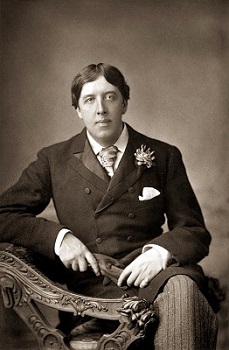 |
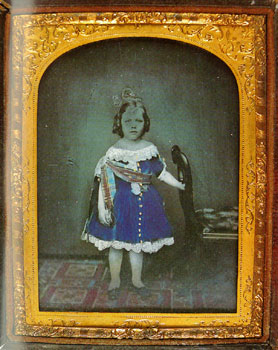 |
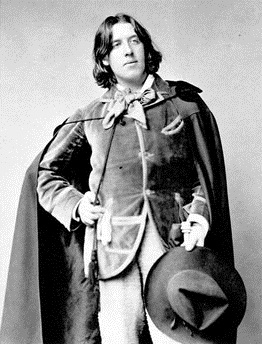 |
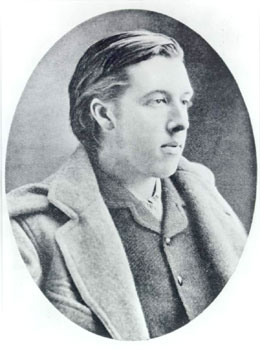 |
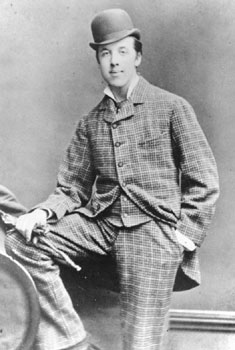 |
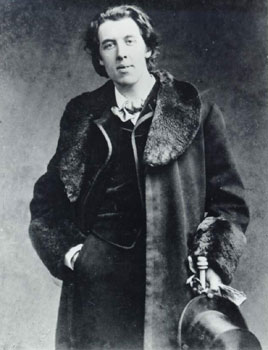 |
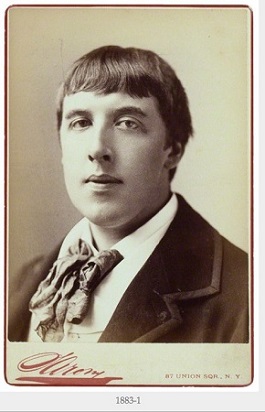 |
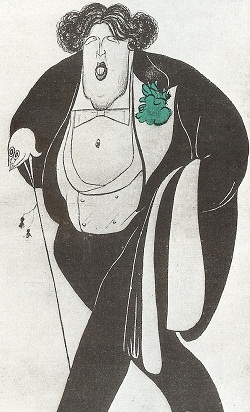 |
| Wilde in 1883; cartoon by Max Beerbohm | |
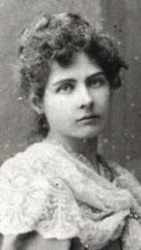 |
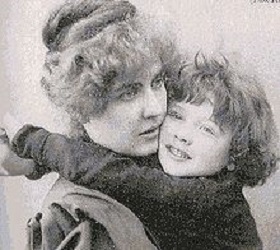 |
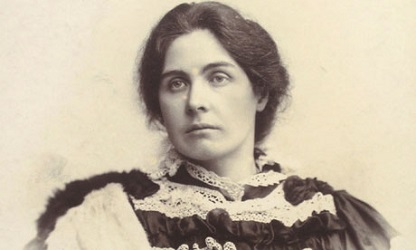 |
| Constance Wilde (centre - with Cyril) |
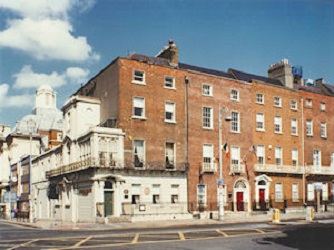 |
| 1, Merrion Sq. (Dublin) |
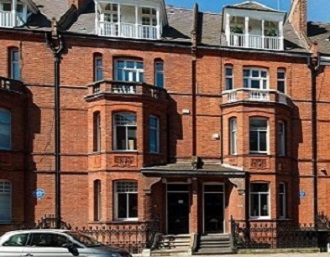 |
| Tite Street (London) |
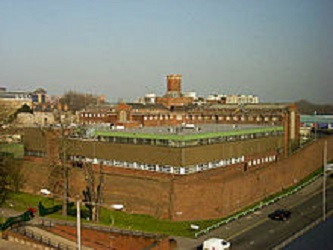 |
| Reading Gaol |
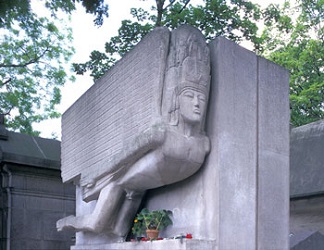 |
| Père Lachaise (sculpt. Jacob Epstein) |
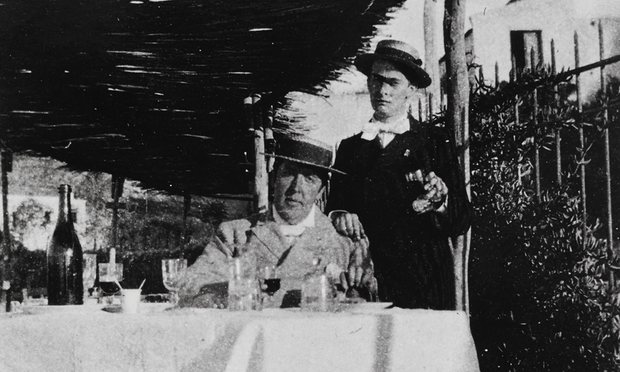 |
| Oscar Wilde & Bosie Douglas (Paris, 1897) |
| [ back ] | [ top ] |